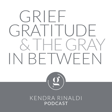
Simplifying End-of-life Tasks, & Estate Planning with Adam Zuckerman
In this episode, we sit down with Adam Zuckerman to discuss the importance of estate planning and how to simplify end-of-life tasks. Adam shares his personal journey through grief, including the sudden loss of his father, and offers valuable insights on managing the emotional and logistical challenges that come with it. Learn how to organize your affairs to provide peace of mind for yourself and your loved ones.
More about Adam Zuckerman and https://buriedinwork.com/
Adam Zuckerman is the Founder of Buried in Work, a leading eCommerce platform specializing in estate planning/organization, end-of-life tasks, and estate transitions.
With a deeply personal motivation stemming from his experience managing his father's estate, Adam is dedicated to simplifying these complex processes for individuals and families nationwide.
As an Eisenhower Fellow, attorney, and MBA, Adam brings a wealth of expertise to his role, combining legal knowledge with entrepreneurial vision to drive innovation in the field of estate planning.
Adam's mission is to empower individuals of all ages to navigate the intricacies of estate planning with confidence and ease. Through Buried in Work, he seeks to revolutionize the way people approach end-of-life preparations, ensuring that everyone has access to the resources they need to secure their legacy and protect their loved ones.
Contact Kendra Rinaldi to be a guest or for coaching inquiries: https://www.griefgratitudeandthegrayinbetween.com/


